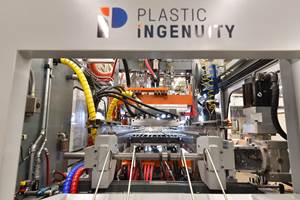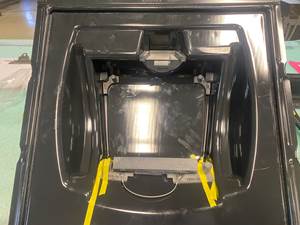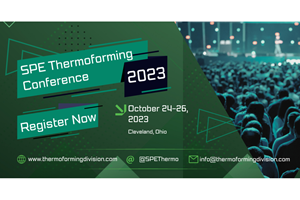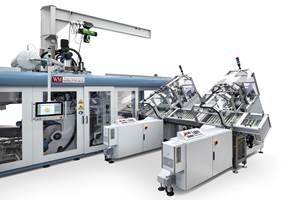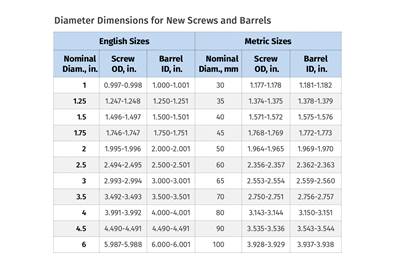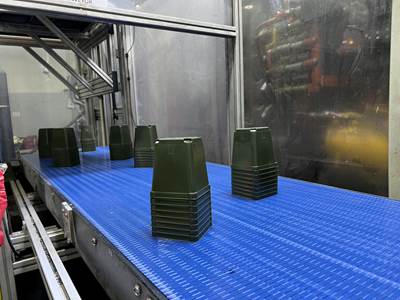Thermoformer’s ‘Black Art’ Legacy Remains Today
While the thermoforming industry has made major strides in moving from black art to science in the last 50 years, there remains an unscientific element to the process that makes it a unique and challenging business.
While the thermoforming industry has made major strides in moving from black art to science in the last 50 years, there remains an unscientific element to the process that makes it a unique and challenging business. That’s the view of Rick Goldman, president of Mercury Plastics Inc. in Chicago, a custom thermoforming shop founded by his father John in 1955.
“We had more artists back then who had incredible hand and eye skills,” says Goldman. “Many of those craftsmen are gone and we’re more into the science now so we can be more productive and repeatable with our process.” Today, the company’s 60-plus employees have been trained in the latest process and moldmaking technology. Still, Mercury relies to an extent on veteran operators who can dial in settings based on experience and “gut feel” and make adjustments on the fly to maintain a consistent process.
P-O-P signs spur growth
The elder Goldman, who retired last year, was 32 when he opened a business in his garage in 1955. Before that, he had worked at Felsenthal Plastics in Chicago, a molding shop started by his grandfather in the 1890s. Goldman started out using a hand router to make acrylic templates for drafting boards. Later that year, he moved to a 1500-sq-ft space on Diversey St. in downtown Chicago and bought his first AutoVac thermoformer. Some of his first forming jobs were polystyrene and PVC material-handling trays and insulation covers for Motorola transistor radios.
By 1964, Goldman had moved to a new 6000-sq-ft location and had three vacuum formers and two punch presses. Mercury was expanding into what would become a key market area: silk-screened point-of-purchase signs of PS for the liquor and beer industry.
While it specialized in POP signs, Mercury made a conscious effort to remain nimble and diversified. The company expanded into rotary thermoforming because it “couldn’t be competitive forming one sheet at a time,” explains John Goldman. A move into roll-fed continuous forming also spurred strong growth for the company in cosmetic packaging. This diversification meant that Mercury experienced neither economic tailspins nor sharp upturns in its long history. Instead, the Goldmans say the company’s fortunes have been steady as an arrow.
Keeping up on technology
Mercury invested continuously in the latest equipment. But in the old days, money was tight and credit and lease options were nonexistent. “Back then, you had to buy the equipment outright,” recalls John Goldman. “The lack of funds held us back until leasing and credit became available.”
Today, the company’s 150,000-sq-ft plant boasts 30 thermoformers, over a dozen CNC routers, several CNC machining centers, water-cooled aluminum tooling, and a six-color automatic screen printer.
“We’ve always listened to the market and expanded operations and machinery accordingly,” says Rick Goldman. The company held true to that belief even when he thought in the early 1990s that “there was no tolerances our customers needed to hold that required us to invest in CNC routers.” He had to eat his words later.
Since he joined his father in 1977, son Rick has watched customers become more sophisticated and competition more fierce. Product-development cycles have been compressed and pricing pressures have become “incredible.” Years ago, a tooling blueprint was delivered by mail; today, CAD files are e-mailed within minutes.
This has all changed the way suppliers deal with customers, according to Rick Goldman. So-called “relationship buying,” which was the bedrock of business in the 1950s and 1960s, has given way to buying decisions made solely on cost. “You’re not dealing with owners of companies anymore, you’re dealing with purchasing directors and engineers,” says John Goldman.
The younger Goldman believes that Mercury is poised for the future as thermoforming takes expanded roles in large-part manufacturing and as a cost-effective alternative to injection molding. Mercury’s game plan is unchanged from the last 50 years. “Our customers are what we are all about,” says Goldman. “Wherever they’re headed, we’re following.”
Related Content
Ingenuity Is Part of This Former’s Name, and in Its DNA
Plastic Ingenuity started in a garage in 1972 and through a commitment to developing best-in-class products stands today as one of the largest custom thermoformers in the world.
Read MoreThermoformer Maximizes Productivity with 3D Printing
Productive Plastics has created an extensive collection of 3D printed manufacturing aids that sharply reduce lead times.
Read MoreClock's Ticking: Register Now for 2023 SPE Thermoforming Conference
Three-day event kicks off Oct. 24 in Cleveland.
Read MoreAutomation in Thermoforming on the Rise
Equipment suppliers’ latest innovations exemplify this trend driven by factors such as labor shortages, higher-speed thermoformers and tighter quality control.
Read MoreRead Next
Troubleshooting Screw and Barrel Wear in Extrusion
Extruder screws and barrels will wear over time. If you are seeing a reduction in specific rate and higher discharge temperatures, wear is the likely culprit.
Read MoreProcessor Turns to AI to Help Keep Machines Humming
At captive processor McConkey, a new generation of artificial intelligence models, highlighted by ChatGPT, is helping it wade through the shortage of skilled labor and keep its production lines churning out good parts.
Read MoreLead the Conversation, Change the Conversation
Coverage of single-use plastics can be both misleading and demoralizing. Here are 10 tips for changing the perception of the plastics industry at your company and in your community.
Read More















.png;maxWidth=300;quality=90)


